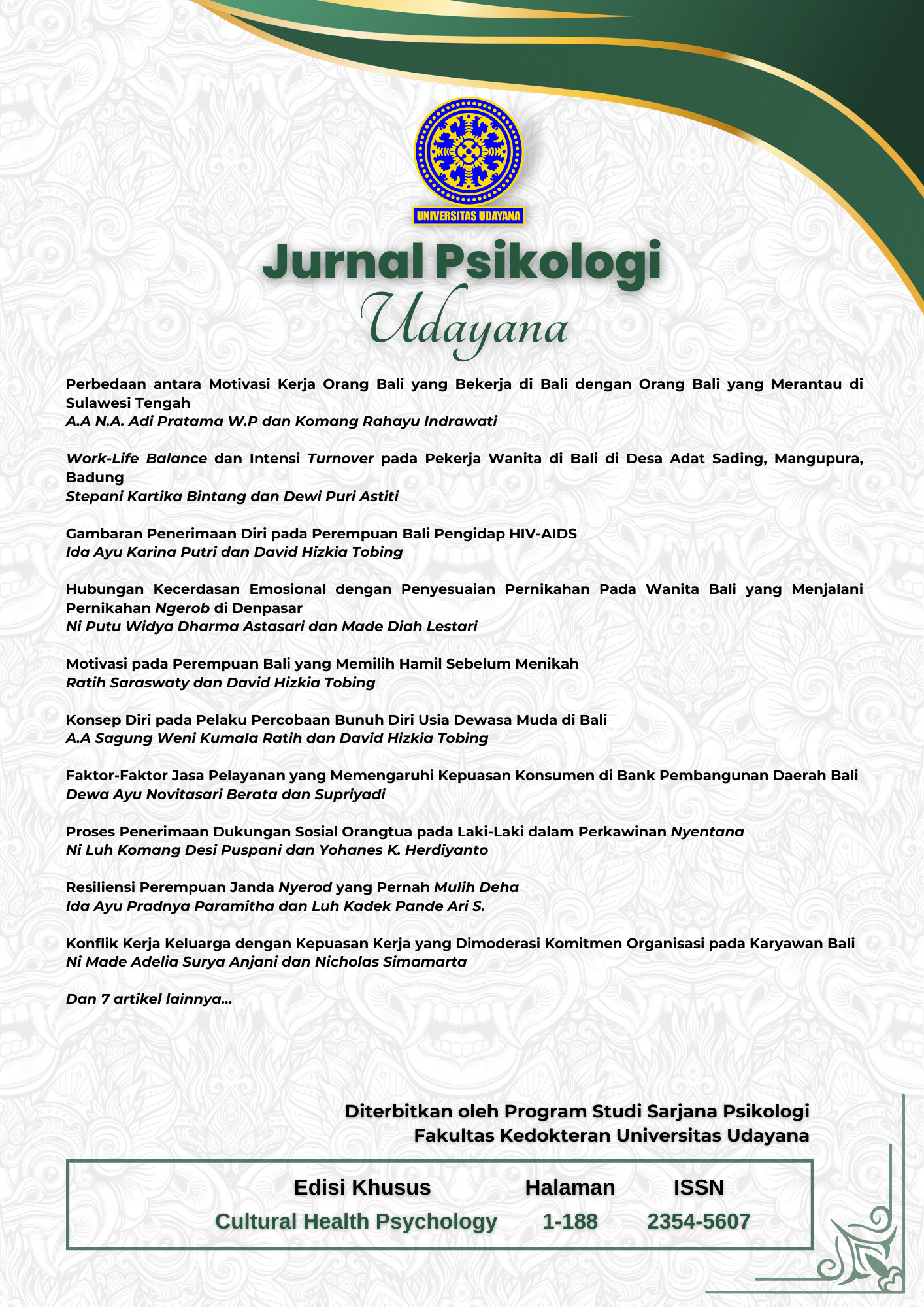PROSES PENERIMAAN DUKUNGAN SOSIAL ORANGTUA PADA LAKI-LAKI DALAM PERKAWINAN NYENTANA
Abstract
Sacred vows in a marriage generally requires consent from parents. Likewise in Bali on nyentana marriage, which makes the parents of the men sometimes reject and do not approve of her son who wish to nyentana to the woman's family. Psychologically, the role of parents who participated in the affairs of his marriage is a form of social support from parents.
This study was conducted to determine how the acceptance of social support from parents in men which is nyentana marriage, and what are the social support received and needed by men in nyentana marriage from his parents. This research is a qualitative research with a case study approach. Collecting data in this research using observation and interviews on the two Balinese men who do the nyentana marriage with category one person divorced and one person who is not divorced.
The results of this research indicate that both mens were nyentana both divorced an non-divorced get the same social support from their parents like information support, instrumental support, emotional support, and esteem support. Based on the acceptance of social support from parents, mens who divorced get the esteem support during the courtship process and get a support again when his wife is pregnant because their parents forbid their wedding before. It’s different with mens who are not divorced get te social support from his parents when their having a baby.
Keywords: social support, parents, men, marriage, nyentana
Downloads
References
Andarini, S. R., & Fatma, A. (2013). Hubungan antara distress dan dukungan sosial dengan prokrastinasi akademik pada mahasiswa dalam menyusun skripsi. Talenta Psikologi, (Online), Vol. II, No. 2, pp. 159-180, (file:///C:/Users/HOME/Downloads/72-146-1-SM.pdf, diakses 19 November 2014).
Anonim. (2010). “Sikapi banyaknya kasus perceraian pemuka adat mesti turun tangan”. Bali Post, 7 Januari 2010.
Badan Pusat Statistik. (2011). Persentase penduduk menurut status perkawinan dan jenis kelamin, provinsi bali 2011. Denpasar: Badan Pusat Statistik Provinsi Bali.
Bali Sruti. (2011). Agar luh tak sekedar peluh. (Online). (http://www.balisruti.or.id/wp-content/uploads/2011/09/Bali-Sruti-No1-for-web.pdf, diakses 8 April 2014).
Canavan, J., Pinkerton, J., & Dolan P. (2000). Family support direction from diversity. (Online),(http://books.google.co.id/books?id=vH59Vyjpgv4C&pg=PA3&lpg=PA3&dq=Family+support+direction+from+diversity&source=bl&ots=Vd15Faww21&sig=nyeWQvuAoxVs20KeopXfvWaHr4Y&hl=en&sa=X&ei=MLlsVMW6M4gugTO9YLwAg&redir_esc=y#v=onepage&q=Family%20support%20direction%20from%20diversity&f=false, diakses 16 November 2014).
Degenova, M.K. (2008). Intimate relationships, marriages & families. (7th ed.). New York: McGraw Hill.
Dewanti, W. T. R. (2012). Perbedaan penyesuaian pernikahan pada suami dan isteri yang dijodohkan dengan yang tidak dijodohkan. (Online), (http://thesis.binus.ac.id/ecolls/Doc/Lain-lain/2012-1-00733-PL%20Ringkasan.pdf, diakses 14 November 2014).
Donna, D. F. (2012). Penyesuaian perkawinan pada pasangan yang menikah tanpa proses pacaran (ta’aruf). e-Jurnal Psikologi, (Online), (http://publication.gunadarma.ac.id/bitstream/123456789/1876/1/Artikel_10503039.pdf, diakses 14 November 2014).
Kansil, C. S. T. (2007). Latihan ujian: pengantar hukum indonesia. Jakarta: Sinar Grafika.
Koentjaraningrat (2005). Pengantar antropologi: Pokok-pokok etnografi (2nd ed). Jakarta: Rineka Cipta. Terbitan ke-3.
Malau, R. J. (2013). Gambaran dukungan sosial keluarga pada pasangan pernikahan beda etnis (batak toba-tamil). Medan: Skripsi-Fakultas Psikologi Universitas Sumatera Utara. (Online), (http://repository.usu.ac.id/bitstream/123456789/37500/7/Cover.pdf, diakses 10 April 2014).
Moleong, L. J. (2004). Metode Penelitian Kualitatif. Bandung: PT. Remaja Rosdakarya.
Nursalam, & Kurniawati, N. D. (2007). Asuhan keperawatan pada pasien terinfeksi HIV/ AIDS. Jakarta: Salemba Medika.
Parthami, P. W. (2009). Konstruksi Identitas Jender Laki-Laki pada Pemuda Desa Adat Tenganan Pegringsingan, Kabupaten Karangasem, Bali. Jakarta: Fakultas Psikologi Universitas Indonesia. (Online). (http://lib.ui.ac.id/opac/themes/green/detail.jsp?id=125746&lokasi=lokal, diakses 10 November 2013).
Pusparini, D. (2013). “Korban nyentana”. (Online). (http://dnpusparini.wordpress.com/2013/05/18/korban-nyentana/, diakses 17 Maret 2014).
Putrawan, I. W., & Sari, N. P. (2012). Statistik demografi dan sosial ekonomi rumah tangga provinsi Bali 2012. Bali: Badan Pusat Statistik Provinsi Bali.
Sanderson, C. A. (2004). Health psychology. New Jersey: John Wiley-Sons, Inc.
Sarafino, E.P. (2006). Health psychology : Biopsychosocial Interactions. Fifth Edition. USA : John Wiley & Sons.
Sarafino, E. P., Smith, T. W. (2011). Health psychology : biopsychosocial interactions (7th ed.). United States of America: John Wiley & Sons, Inc.
Strauss, A., & Corbin, J. (2003). Dasar-dasar penelitian kualitatif. Yogyakarta: Pustaka Pelajar.
Strong, B., & Cohen, T. F. (2013). The marriage and family experience: intimate relationships in a changing society, twelfth edition. USA: Wadsworth.
Sudirga, I. B., Mudana, I. N., Suratmini, N. W. (2007). Buku pelajaran agama hindu untuk SMU kelas XII. Denpasar: Paramita.
Sugiyono. (2012). Metode penelitian kuantitatif, kualitatif dan R & D. Bandung: Penerbit alfabeta.
Tambunan, S. (2014). Hubungan dukungan keluarga dengan kepuasan pernikahan pada suku batak toba. Medan: Skripsi-Fakultas Psikologi Universitas Sumatera Utara. (Online).(http://repository.usu.ac.id/bitstream/123456789/39993/7/Cover.pdf, diakses 10 April 2014).
Taylor, S. E., Peplau, L. A., Sears, D. O. (2009). Psikologi sosial, edisi kedua belas. Jakarta: Kencana.
Veronica, W. A. (2013). Kebudayaan nyentana merupakan ciri khas atau kebudayaan dari daerah tabanan. (Online). (http://catatanbiodatadiri.blogspot.com/2013/12/kebudayaan-nyentana-merupakan-ciri-khas.html, diakses 13 Februari 2014).
Windia, W. P., & Sudantra, K. (2006). Pengantar hukum adat bali. Denpasar: Lembaga Dokumentasi dan Publikasi Fakultas Hukum Universitas Udayana.
Wiryadi, R. (2014). Jenis perkawinan menurut adat dan tradisi bali. Dipetik dari Lembongan community, (http://lembongancommunity.com/jenis-perkawinan-menurut-adat-dan-tradisi-bali/, diakses 4 Juni 2014).
Yin, R. (2013). Studi kasus desain dan metode. Depok: Raja Grafindo Persada.
Zaidi , A. U. & Shuraydi, M. (2002). Perceptions of arranged marriages by young pakistani muslim women living in a western society. Journal of comparative family studies, (Online), Vol. 33, No. 4, pp. 495-514, (http://scholar.uwindsor.ca/cgi/viewcontent.cgi?article=4033&context=etd, diakses 14 November 2014)
Authors who publish with this journal agree to the following terms:
- Authors retain copyright and grant the journal right of first publication with the work simultaneously licensed under a Creative Commons Attribution-ShareAlike 4.0 International License that allows others to share the work with an acknowledgement of the works authorship and initial publication in this journal.
- Authors are able to enter into separate, additional contractual arrangements for the non-exclusive distribution of the journals published version of the work (e.g., post it to an institutional repository or publish it in a book), with an acknowledgement of its initial publication in this journal.
- Authors are permitted and encouraged to post their work online (e.g., in institutional repositories or on their website) prior to and during the submission process, as it can lead to productive exchanges, as well as earlier and greater citation of published work (See The Effect of Open Access).













